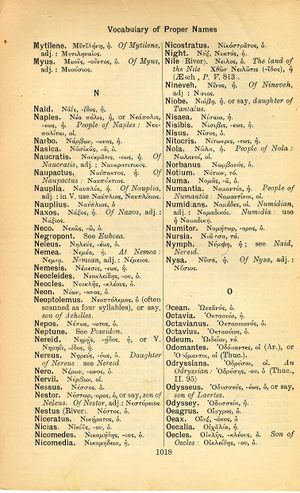Narbo: Difference between revisions
Φίλος με βλάπτων (λυπῶν) οὐδὲν ἐχθροῦ διαφέρει → Laedens amicus distat inimico nihil → Ein Freund, der schadet, ist ganz gelich mir einem Feind
(Gf-D_6) |
(3_8) |
||
| Line 8: | Line 8: | ||
{{Gaffiot | {{Gaffiot | ||
|gf=<b>Narbō</b>,¹² ōnis, m. [f., Mart. 8, 72, 4, cf. ἡ Ναρβών], Narbonne [ville de Gaule] : Cic. Font. 36 || ou <b>Narbō Mārcĭus</b> Cic. Font. 13 || <b>Narbonēnsis</b>, e, de Narbonne : Cic. Br. 160 ; [[Gallia]] Plin. 4, 105, la Gaule Narbonnaise, l’une des quatre grandes divisions de la Gaule.||ou <b>Narbō Mārcĭus</b> Cic. Font. 13||<b>Narbonēnsis</b>, e, de Narbonne : Cic. Br. 160 ; [[Gallia]] Plin. 4, 105, la Gaule Narbonnaise, l’une des quatre grandes divisions de la Gaule. | |gf=<b>Narbō</b>,¹² ōnis, m. [f., Mart. 8, 72, 4, cf. ἡ Ναρβών], Narbonne [ville de Gaule] : Cic. Font. 36 || ou <b>Narbō Mārcĭus</b> Cic. Font. 13 || <b>Narbonēnsis</b>, e, de Narbonne : Cic. Br. 160 ; [[Gallia]] Plin. 4, 105, la Gaule Narbonnaise, l’une des quatre grandes divisions de la Gaule.||ou <b>Narbō Mārcĭus</b> Cic. Font. 13||<b>Narbonēnsis</b>, e, de Narbonne : Cic. Br. 160 ; [[Gallia]] Plin. 4, 105, la Gaule Narbonnaise, l’une des quatre grandes divisions de la Gaule. | ||
}} | |||
{{Georges | |||
|georg=Narbo, ōnis, m. (ἡ Ναρβών, dah. [[auch]] fem. [[bei]] Mart. 8, 72, 4 sq.), [[Stadt]] in dem [[nach]] [[ihr]] benannten narbonensischen Gallien, [[von]] Rom aus kolonisiert (i. J. 118 v. Chr.), dah. [[auch]] [[mit]] dem Beinamen [[Martius]], [[Mela]] 2, 5, 2 u. 6 (2. § 75 u. 81). Caes. b. G. 3, 20, 2. Sall. hist. fr. inc. 11 (2, 16 Kr.). Cic. Font. 3 u. 36. Vell. 1, 15, 5: [[von]] [[Tiberius]] [[abermals]] kolonisiert, Suet. Tib. 4, 1. – Dav.: Narbōnēnsis, e, narbonensisch, [[colonia]], Cic.: [[civitas]], Capit.: [[provincia]], die [[Provinz]] Gallien [[jenseit]] der Alpen, Plin.: [[proconsul]], Spart. | |||
}} | }} | ||
Revision as of 08:38, 15 August 2017
English > Greek (Woodhouse)
Νάρβων, -ωνος, ἡ.
Latin > English (Lewis & Short)
Narbo: ōnis, m., and (late Lat.) Nar-bōna, ae, f., also with the appellation Marcius (after the consul Q. Marcius Rex, who led a colony thither A. U. C. 636),
I a city in Gaul, from which Gallia Narbonensis takes its name, the mod. Narbonne.—Form Narbo, Mela, 2, 5, 2; 6; Plin. 3, 4, 5, § 32; Cic. Font. 1, 3; 16, 36; Vell. 1, 15, 5; 2, 8, 1.— Form Narbona, Capitol. Max. et Balb. 5, 8; Eutr. 4, 23; Inscr. Orell. 218.—Hence,
A Narbōnensis, e, adj., of or belonging to Narbo, Narbonian: colonia, Cic. Brut. 43, 160; id. Clu. 51, 140: coloni Narbonenses, Cic. Font. 2, 14: Gallia, the province of Gaul beyond the Alps, Mela, 2, 5, 1; Plin. 4, 17, 31, § 105.—
B Narbōnĭcus, a, um, adj., of or belonging to Narbo or to Narbonian Gaul, Narbonian: vitis, Plin. 14, 3, 4, § 43.
Latin > French (Gaffiot 2016)
Narbō,¹² ōnis, m. [f., Mart. 8, 72, 4, cf. ἡ Ναρβών], Narbonne [ville de Gaule] : Cic. Font. 36 || ou Narbō Mārcĭus Cic. Font. 13 || Narbonēnsis, e, de Narbonne : Cic. Br. 160 ; Gallia Plin. 4, 105, la Gaule Narbonnaise, l’une des quatre grandes divisions de la Gaule.
Latin > German (Georges)
Narbo, ōnis, m. (ἡ Ναρβών, dah. auch fem. bei Mart. 8, 72, 4 sq.), Stadt in dem nach ihr benannten narbonensischen Gallien, von Rom aus kolonisiert (i. J. 118 v. Chr.), dah. auch mit dem Beinamen Martius, Mela 2, 5, 2 u. 6 (2. § 75 u. 81). Caes. b. G. 3, 20, 2. Sall. hist. fr. inc. 11 (2, 16 Kr.). Cic. Font. 3 u. 36. Vell. 1, 15, 5: von Tiberius abermals kolonisiert, Suet. Tib. 4, 1. – Dav.: Narbōnēnsis, e, narbonensisch, colonia, Cic.: civitas, Capit.: provincia, die Provinz Gallien jenseit der Alpen, Plin.: proconsul, Spart.

